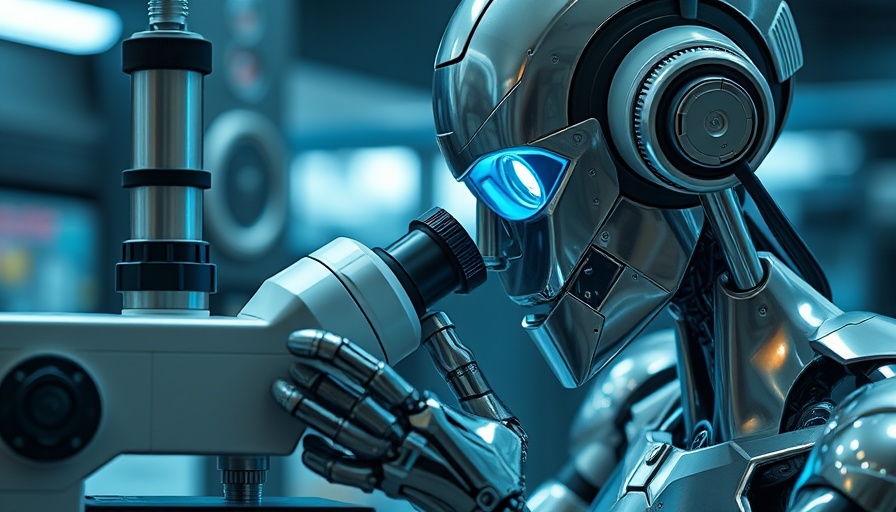
The Looming AI Revolution and its Job Market Disruption
The rapid advancement of artificial intelligence (AI) has ignited a wave of speculation about its impact on employment—an issue voiced compellingly by Geoffrey Hinton, a leading AI pioneer and 2024 Nobel Prize winner in Physics. Hinton's insights present a stark warning that the workforce of the future may look drastically different from today, particularly for those in semi-creative jobs. With automated systems becoming increasingly capable of performing routine intellectual tasks, millions may find themselves displaced, facing a job market transformed by technology.
High-Risk Professions in the Age of AI
Positions such as content writers, translators, accountants, analysts, and paralegals may be on the frontline of this workforce revolution. Hinton points out that AI can easily replicate the tasks carried out by these roles, raising alarm for those who have dedicated years to mastering their craft. Call center operators, for instance, are particularly vulnerable as their tasks can be automated with relative ease.
Hinton succinctly stated that he would be "terrified" to pursue a career in a job that could easily be replaced by AI, underscoring the need for job seekers to rethink their career options based on the trajectory of technological innovation. His prognosis does not merely concern future trends; it posits a concrete reality where millions could find their jobs eliminated, elevating this topic to urgency level worldwide.
Finding Safe Harbors in the Job Market
Notably, not every profession is under threat. Hinton highlights fields that are likely to remain secure, at least in the near future. Human-centric roles—therapists, teachers, and high-level researchers—are expected to weather the storm of automation. These professions rely on emotional intelligence and complex interpersonal skills that AI cannot easily replicate.
Interestingly, skilled trades, such as plumbing or electrical work, emerge as robust options for the future job market. Physical tasks that require nuanced manual interactions are still a domain where AI provides limited competition. As Hinton noted, "Becoming a plumber is a good bet"—a phrase resonating with youths seeking stable careers amid an uncertain employment landscape.
A Shift in Career Aspirations Among Generation Z
The changing career landscape is prompting many from Generation Z to rethink their professional aspirations. Reports indicate a noticeable trend in which more young graduates are choosing skilled trades over traditional office jobs. This shift showcases not only awareness of AI's potential impacts but also a readiness to adapt to a rapidly evolving work environment.
As Generation Z embraces manual roles, they are often motivated by the practical benefits these positions afford. Skilled trades offer clear paths to employment, fewer educational barriers, and, importantly, job security in an era riddled with uncertainty about office-based roles.
Broader Social Implications of AI Displacement
Hinton urges society to consider the broader implications of job displacement due to AI—issues that extend beyond mere financial concerns. He paints a picture of a crisis not only affecting individuals' livelihoods but also their sense of purpose. Many derive significant identity from their work, and losing that could yield deep psychological consequences.
As the conversation evolves, advocates like Hinton are pushing for concepts like universal basic income (UBI) to alleviate the economic burdens on displaced workers. The social fabric, as it stands, may face profound challenges as the nature of work—and what it means to individuals—undergoes transformation.
Preparing for the Future of Work: Adapting Wisely
In light of these changes, individuals must navigate this transforming landscape consciously. The first step is awareness: understanding which professions are at risk and embracing the skills that will be in demand in the future job market. Critical thinking skills, emotional intelligence, and adaptability will become increasingly necessary attributes, allowing individuals to thrive amid technological advancements.
Networking and mentorship can also play vital roles in preparing for the shifting landscape. By fostering relationships with industry leaders or becoming involved in tech communities, individuals can gain insights into future opportunities and align their career paths accordingly.
Embracing Change: A Collective Responsibility
The era approaching us demands collective acknowledgment and preparedness. Companies, educators, and government entities must urgently address workforce training, exploring innovative educational programs and professional transitions for those affected by automation. The transition to a landscape where only certain roles persevere must be managed with empathy and foresight to support a populace in need of guidance.
Conclusion: A Call for Adaptability and Resilience
The picture painted by Geoffrey Hinton regarding the future of employment is sobering. As we endeavor to navigate the complexities introduced by AI, cultivating resilience and adaptability will be crucial. Embracing lifelong learning and prioritizing job skills that AI cannot replicate will not only prepare us for the inevitable changes ahead but also empower individuals to find their place within a radically evolving society.
 Add Row
Add Row  Add
Add 




Write A Comment